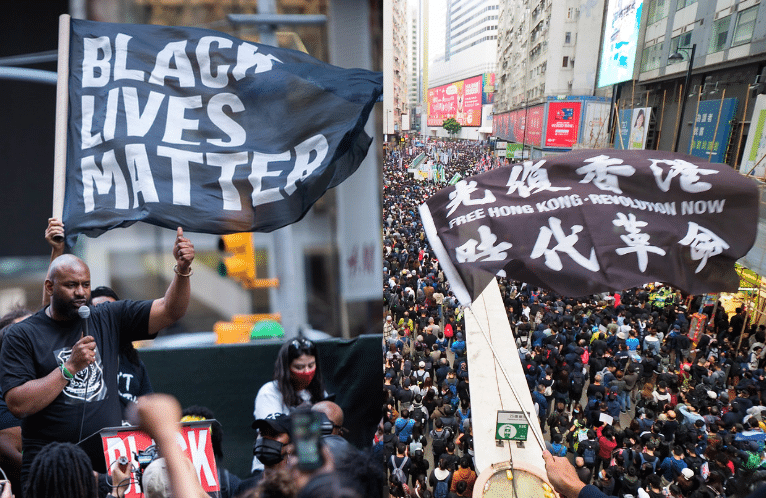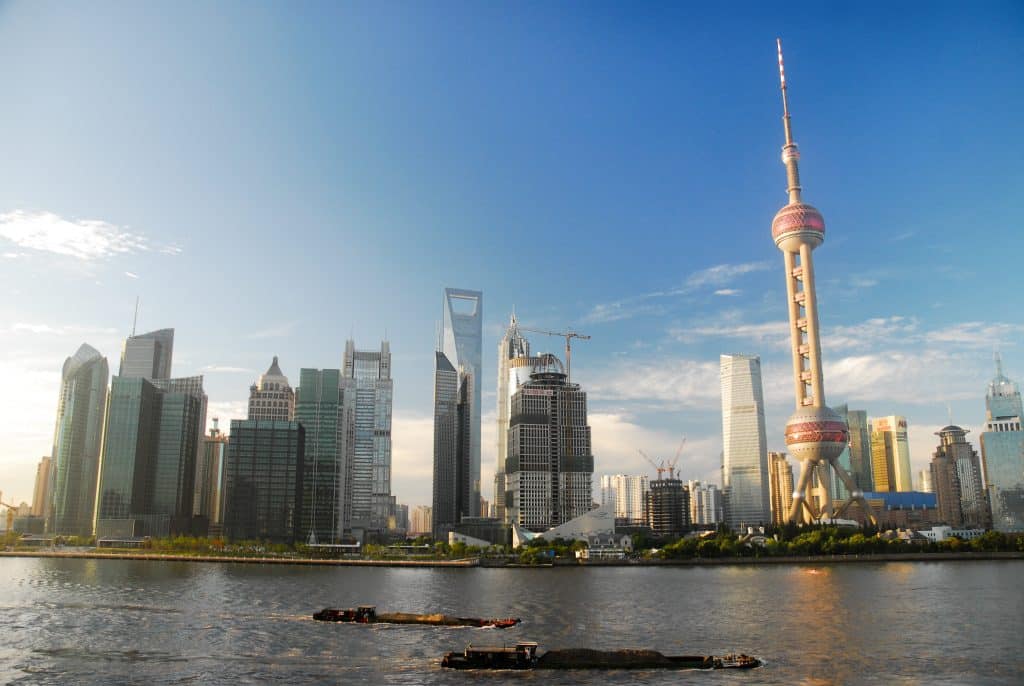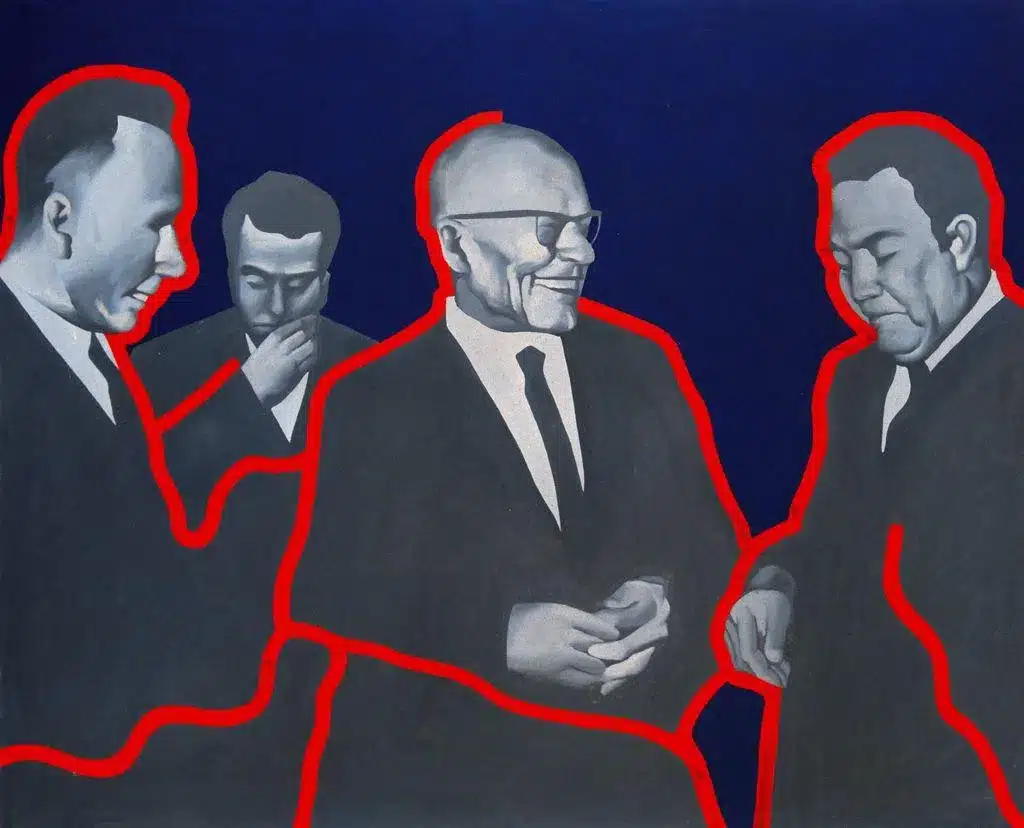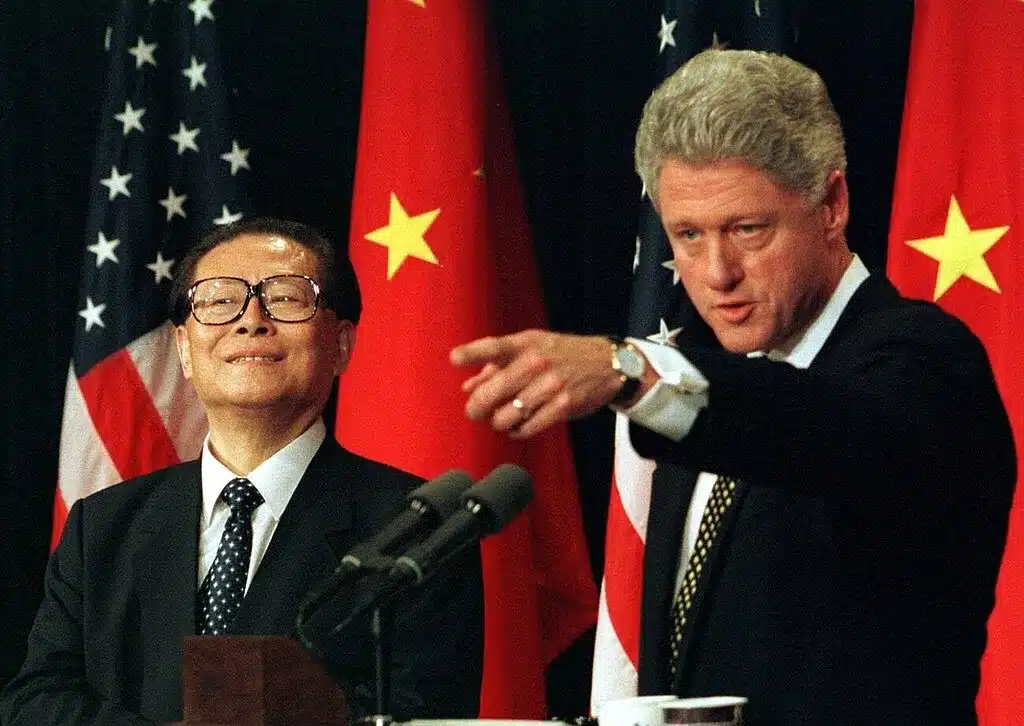2020 and the Challenge of International Solidarity w/ Sharon Yam
- Interviews
 Miranda Wilson
Miranda Wilson- 01/03/2025
- 0

As the world prepares for a second Trump presidency, many find themselves reflecting on the end of his first term. In 2020, Trump handled, sometimes gracelessly, an out-of-control pandemic and civic unrest catalyzed by the killing of George Floyd by police in Minneapolis. While protests against state violence hit the streets in the United States, mass movements entered the streets of Hong Kong opposing a national security bill issued by Beijing. Although the Hong Kong protests were a revival of actions that began in 2019, the simultaneous eruption of street movements in the United States and Hong Kong led many American progressives to search for similarities. However, Hong Kong’s colonial history and the history of racial oppression in America, led participants in each movement to very different conclusions about potential allies and the utility of appealing to the Trump administration for help in battling authoritarianism.
The Monitor interviewed Dr. Sharon Yam about her research on the parallels between these movements that occurred in 2020. Her research into these events focuses on the significant role of social media in movement organizing and the personal experience of diasporic Hong Kongers (particularly in America) of navigating support for movements which, at times, had starkly opposing views of the U.S. government.
Sharon Yam is Associate Professor of Writing, Rhetoric, and Digital Studies, and a faculty affiliate of Gender and Women’s Studies and the Center for Equality and Social Justice at the University of Kentucky. She is one of the series editors for the Ohio State University Press’s New Directions in Rhetoric and Materiality. Her research focuses on questions of identity, citizenship, affect, race, and most recently, reproductive justice. Her book Inconvenient Strangers: Transnational Subjects and the Politics of Citizenship examines how three transnational groups—mainland Chinese maternal tourists, Southeast Asian migrant domestic workers, and South Asian permanent residents—engage with the existing citizenry and gain recognition through circulating personal narratives.
Miranda Wilson: Your work around Hong Kong makes use of ethnography as a research method. Particularly the notion of “digital ethnography.” How has social media played a role in your research and your understanding of grassroots organizing?
Sharon Yam: Very early, even in the early 2010s, we started looking into the use of social media in grassroots movements (for example, Manuel Castells’s work). There was the Arab Spring, Occupy Wall Street, and then later on in Hong Kong the Umbrella Movement and the 2019 Anti-Extradition Movement. Social media played a key role because those movements were increasingly becoming decentralized. There is a risk of disclosing one’s identity once the state authorities start surveilling the people organizing—so how do people organize and communicate when they don’t even know each other?
I started looking into social media because I’m in a diasporic position; I’m not really on the ground all the time. In a sense, it is a perk for me because I still get to hone in on the discourse that activists are having. For me, as a rhetorician who studies how people make meaning, persuade, and communicate, what is really interesting is how people talk to each other whom they previously didn’t really have a relationship with under the guise of pseudonyms and faceless anonymity. At the same time, they have to coordinate with one another and repeatedly orchestrate high-stake and high-risk activities.
In addition to that, the challenge is that social media discourse is very ephemeral. I may see something one day, and the next day it’s been removed–or the person has chosen to take it down, or the government has censored it. It is a matter of figuring out how to logistically collect these data and save them. Social media research can pose an ethical conundrum because people who are posting may not expect what they’re writing to be analyzed or published for a wider audience. Just because something is in a public domain, just because someone is tweeting publicly, doesn’t necessarily mean that we as researchers have blanket permission to publish their work and publicize them without their explicit permission.
MW: You write about the importance of studying history and international relations from a feminist perspective. What are the benefits of analyzing history, particularly in the context of Hong Kong, in this way?
SY: Because I am a feminist scholar, I see that a lot of the time when we think about Hong Kong or geopolitics, there is a very masculinist and patriarchal bend to it. Even in international relations, we think of the stakeholders as nation-states, as those who are in power, and the whole political system, at least the dominant institutions, is set up in a way that is very much top-down. Who are these decision-makers? Most of them men, white men. In the case of China, not white men, but still senior older men in seats of power. And then we have seen grassroots organizing in Hong Kong, Thailand, Myanmar, and Taiwan, which are youth-led, queer-led movements. These movements diametrically oppose not just relatively oppressive authoritarian authorities, but also the demographic and the composition of who has power in the institution versus who is resisting.
I think we as researchers need to take into account the ethos of those movements. For me, adopting a queer feminist framework helps uplift and amplify the voices among those movements who have been marginalized both in the local and transnational context, and also in the academic context of geopolitics. Marginalized folks have a particular knowledge and understanding based on their own experiences, and as researchers, it’s important for us to respect that knowledge. I pay attention to the ways folks are writing and talking about their experiences rather than a state narrative or state discourse of what these people want to say. The other strategy is to observe and look at relationships and ways of organizing outside of the confines of an institution. What are people doing that is beyond advocating for a particular policy change? We see that in Hong Kong, for instance. Folks after a while were like, “You know what? Screw that. We don’t even want to talk to the Chief Executive about this. We refuse to even play that game.” I think that the ethos of a queer feminist framework is not to dismiss political actions and discourse that have taken place outside of the normative institutions.
MW: You have drawn a parallel between the 2020 Black Lives Matter movement in the United States and the anti-authoritarian movement in Hong Kong. What are some of the similarities you observed between these movements?
SY: In terms of similarities, both movements were led by folks who are disenfranchised by the state, by dominant institutions, and decided to rise up. Both of them were also using decentralized methods. Black Lives Matter (BLM) is becoming an international organization, but at that time there were local marches and movements that were really specific to that community. In Hong Kong, we also similarly have protestors saying there’s no big stage, the big stage being a centralized organizer. Doing it this way allows the activists to respond to very context-specific demands and threats, allowing them to become more agile.
Something different between the two is that Hong Kong protestors appeal more to state powers outside of Hong Kong. Sometimes at protests, they fly the colonial British flag or sometimes the American flag. We can read into it that Hong Kong has never been sovereign or had any political autonomy or independence. Perhaps in that sense, their political imagination is more confined to the need to appeal to another state power to counter China.
The other main difference is of course the dimension of race. BLM aims to address anti-Blackness and systemic white supremacy. In Hong Kong, the discussions of race are very obfuscated. We have isolated moments of discussions about say, South Asian participants in the movement, or migrant workers from Southeast Asia, but their experiences in the movement were not particularly amplified or integrated into part of the broader narrative. That’s something I want to flag: there is still racism and racial marginalization outside of the U.S. context. Just because the dominant population is not white does not mean that racism doesn’t exist. That’s a key difference but also a potential fissure of why it has been difficult to build a coalition between the two.
MW: For diasporic Hong Kong advocacy groups in the United States, what was it like to experience both the BLM and anti-authoritarian movements at the same time?
SY: Even diasporic Hong Kongers in the United States have a lot of differences among them. A lot of the time we think of “coalition” as we’re focusing on the differences between groups or among groups. In this case, even among diasporic Hong Kongers, we have folks who have more leftist progressive values who have been organizing alongside Black and Brown folks in the U.S. for a long time, even before the 2019 movement happened in Hong Kong. For those people, they see anti-racist movements and the Hong Kong movement as connected through this shared goal of challenging authoritarian power. In that case, the authoritarian power is the U.S. government or the Trump administration. But on the other hand, you also can also see diasporic Hong Kongers who are politically more centrist or perhaps more to the right; they are more focused on making sure that Hong Kong is okay. They want to make sure that Hong Kong doesn’t fall into China’s hands. But what does that look like? We don’t really know because there has never been an autonomous Hong Kong. So, for those folks, their focus is much more singular. In interviews that these people have done, they talk about how they understand that the Trump administration or right wing politicians probably just use Hong Kong for their own benefit, but those are the only people who are in a position of power to help Hong Kong. That’s why they feel the need to appeal to them.
So within the group of diasporic Hong Kongers in the United States, there is this ideological difference. Of course, you can see how someone who has been protesting alongside immigrants and Muslims and Black folks would have an issue with folks who are wearing MAGA hats. Some thought that Trump would take an even harder line against China. That fissure at the time was huge. I don’t know if it’s something that can be reconciled. Leftist Hong Kong organizers will always ask “Hong Kong should be free from who?” Even if it’s free from China, it is still under the United States’ control, so it’s not actually free. There’s a big disagreement on what freedom means. That was the stickiest point at the time, and probably will be going forward.
MW: Similar to what we have already discussed, transnational cooperation between Hong Kong activists in the West and in China also faces certain barriers. What are these barriers between diasporic and local Hong Kong advocacy groups and how can they be overcome?
SY: Right now, because of the national security law, almost all well-known and prominent activist pro-democracy legislators are in jail. There’s a wholesale erasure of civil society in Hong Kong. Of course, there are still folks who are organizing and building up civil society in small ways, but in the United States, the main groups that have been doing this advocacy work are in the Hong Democracy Council based in D.C. Their focus is more on lobbying, but also on some forms of community building and collective imagining among diasporic folks. There are also similar organizations and groups that are focusing on the needs of diasporic Hong Kongers. A lot of them are new immigrants after having fled persecution, or they just decided that Hong Kong is not a viable place to live anymore. In the UK, for example, Hong Kongers who have immigrated there, the emphasis is on helping these new Hong Kong immigrants find jobs and get settled.
But back in Hong Kong, activists are facing a totally different set of challenges: how do they find nooks and crevices where they can continue organizing despite or in spite of suppression? There are more organizations that are more transnational. One that comes to mind was this group of trained therapists and psychiatrists, a lot of them operating outside of Hong Kong, like in the UK, United States, and Canada – they were offering services and helping coordinate workshops for Hong Kongers who have been traumatized. But I think right now, because of the political persecution, their needs are basic livelihood. On the other hand, sure, Hong Kong folks who stay in Hong Kong’s basic livelihood is still the same, but they’re facing a totally different set of challenges. The connection is more difficult to maintain in that sense.
MW: Thinking more about 2020, your article also touches on the anti-Asian racism that ramped up during the pandemic. I am curious about the ways these sentiments impacted diasporic Hong Kong communities as well as Hong Kong itself. How did advocacy groups respond?
SY: That created a whole other fissure within the Hong Konger groups. For folks who were still living in Hong Kong at the time, because they were of the ethnic majority, they were not facing anti-Asian racism. Meanwhile, you have Hong Kong Americans or Asian Americans, including second or third generation, who identify more as people of color. This has created some conflict.
There was a leftist diasporic Hong Kong advocacy group that I was a part of, and we were at the time considering doing some kind of joint coalitional organizing with a labor organizer located in Hong Kong. However, this person had said something about supporting Trump despite the fact that Trump had been repeatedly fueling this anti-Asian discourse about not just the “Wuhan virus,” but really representing Asian people, including Asian Americans as the disease vector. In the end, that coalition fell apart because those who reside in the United States felt that the organizer thought it was okay to throw us who are bearing the brunt of anti-Asian hate crimes under the bus for the sake of local Hong Kongers’ struggles. When it was put in this binary, either we have to support the Trump administration and also accept the racist anti-Asian rhetoric, or we can only focus on Hong Kong, that’s when coalition will not be able to thrive.
The fault line is how we are weighing peoples’ risks and trauma: whose trauma and interests should we prioritize over whose? That’s a very unproductive and reductive framing that creates a hierarchy when we should be dismantling that. What was really difficult at the time was the multiple different crises going on. When we are in the throes of crisis, there is a tendency for us to center our own struggle, our own suffering, sometimes at the expense of potential collaborators. When that happens, there’s an additional layer of trauma because we are fighting with not feeling seen by folks who we hope to be our allies in the movement.
MW: Something similar happened with the Stop Asian Hate movement and the Black Lives Matter movement in the United States. What are some strategies that can be employed to encourage advocacy groups to be collaborators rather than competitors?
SY: I’m glad that you point out the Black Lives movement and the Anti-Asian Hate movement domestically in the United States. So at the time, the fissure had to do with Asian Americans and the model minority myth, and also because a lot of the Asian immigrants came to the United States around 1965 through the Hart-Celler Act, a law that primarily benefited folks who were educated and upper middle class. In that sense, upper middle-class Asians have somewhat benefited from a structure of white supremacy. Because of that, during the anti-Asian hate crime, there was a call for increased police presence thinking it would make communities safer. Of course, Black and Brown people argued that those cops were the exact ones who had been killing them.
So, is this a diametrically opposing difference that we cannot bridge? But how about the shared interest or the shared struggles that we all face in a white supremacist system? We are seeing some examples of joint events and workshops by progressive Asian American groups and Black Lives Matter organizers educating folks on the history of how this racial divide came to be. Folks even talk about activists during the Civil Rights Movement, and even later, thinking about activists like Grace Lee Boggs or James Boggs. There is in fact a long history of Asian-Black solidarity in the United States. There are more progressive Chinese American youth led groups that made bilingual educational materials/toolkits for folks to talk with their Asian parents or grandparents about anti-Blackness. These toolkits were about political education that is approachable and accessible, not about blaming or shaming people or asking why they are racist.
Research has shown that shame and blame doesn’t work. It often creates a cognitive bias and a backfire effect. It makes people want to double down on what they already believe in. A strategy could be that we don’t think of the solution in grand terms or big drastic changes, but rather we focus on [an] unglamorous [goal] that doesn’t look very dramatic. Little acts of solidarity and organizing are often not very visible. But I think as researchers, it’s important for us to not overlook small acts. Be curious and have this praxis of uplifting local acts of coalition.
MW: Republican politicians in the United States like Ted Cruz and Marco Rubio were vocal supporters of the Hong Kong movement. Yet, for some, their support seemed hypocritical due to their resistance to speak out against similar police crackdowns in the United States. What do you make of this dynamic and cognitive dissonance on the part of certain American politicians?
SY: I don’t think it’s a cognitive dissonance. I think it is very in line with the political and ideological agenda. Going back to my early answer about how Asian Americans were often represented in dominant political and cultural discourses as the model minority, Hong Kongers, even in international news media, have often been upheld as the model protestors. Even during the Umbrella Movement, there were comments made in Western media about how Hong Kongers are so polite and respectful. They mentioned how after they protest and march they clean up after themselves. They’re not violent, for example.
Of course, later on, the Hong Kong movement became violent. That is a whole other discussion about whether we should only uplift nonviolent protests. But it’s becoming this kind of divide-and-conquer tactic to say, “Look, if Black Lives Matter protestors are more polite and more like those folks over there, their protests would be successful. The only reason for this response is not because we are racist or anti-Black but because they are rioters.”
At the same time, cracking down on Black protestors is a coherent ideological agenda because it’s pitting one against the other. This, of course, creates more obstacles for any sort of solidarity and coalition. For folks who are in Hong Kong who may not understand the long history of the model minority myth and anti-Blackness, it is easy to overlook how the Hong Kong movement has been used as a political tool to further something that was not really what the movement was demanding.
MW: In your reflections on your own life, you’ve described experiences straddling different communities. How do you balance this “multi-membership” in your own life and work? Any insights for other people who might be attempting to balance their roles in different communities?
SY: I think there are multiple salient positionalities. One is that I’m simultaneously a subject and object of research. The other part is that I have friends and family members and loved ones who are in the local Hong Kong movement, who sometimes espouse political beliefs and discourse that I do not agree with. For example, an autoethnography project [ethnography into one’s own life], I wrote about the fact that my mom who lives in Hong Kong was a staunch Trump supporter for a very long time and also believed in the disinformation campaign that the election was stolen. She also was really supportive of Trump’s anti-China discourse when, from my vantage point, the anti-China discourse is often conflated with broader racist anti-Asian discourse that has very direct material impacts on Asian people in the United States.
The hard part is multi-fold. First, how can I continue to uphold my integrity as a researcher when personally I’m feeling like my own sense of safety is at stake? Second, how do I keep my critical lens when I’m also so intimately and personally part of something? How I’ve come to think about this is that none of this is a binary or mutually exclusive to one another. Bringing this full circle to one of your first questions about why I’ve always used a feminist queer framework: in feminist scholarship and activism, we know that the personal and the political are always forming one another. We cannot say strictly this is my personal life and this is politics. No, because the political context is always impacting our personal lives and what we choose to believe in. Perhaps then, being simultaneously the subject and object of study is not a deficit, but rather how we became interested in doing research on certain topics. Rather than assuming that we can demarcate, we can just be very transparent. This is how we make meaning all the time.
It’s more helpful for us to confront the messiness of research, the messiness of even living a political life. A suggestion to folks, even to folks who think that they only occupy membership in one community, is to recognize that things are never that clean. Ultimately, we do better, more interesting, more ethical scholarship when we are honest with ourselves and our research participants on the messiness of it all. A lot of queer feminist research methodology considers research participants as partners, as folks we are co-creating meaning with as interlocutors.
The TLDR is that lines never really exist, or they don’t actually exist in a very rigid, meaningful way. We rely on these lines and categories to keep us comfortable, but when we interrogate the validity of these strict boundaries is exactly when much more generative scholarship and imaginations happen.
MW: As a scholar of rhetoric, how do rhetorical strategies play a role in the U.S.-China relationship? How might we use rhetoric to improve the relationship in the future?
SY: We consider any kind of meaning-making using symbols to be rhetorical. It isn’t just making an argument, it can also mean how we choose to post on X. Even the decision whether to use X or Blue Sky is a rhetorical decision because we are making an intentional decision to decide how we want our message to circulate.
In terms of the U.S.-China relationship, I would go back to the earlier point that when we think about Sino-U.S. relations, a lot of the time we focus on high-level geopolitical conversations. What we end up missing is how people are directly impacted by these policies and if they get to have a voice in this.
I want us to think about it in more granular terms as researchers, even as journalists or as folks who are interested in this. How can we look into discourse at both the local and transnational dimensions that are beyond state institutions? What kind of relationships are we building with one another that are outside of the White House and the CCP’s authority? But of course, those are way harder to find because local folks who are most impacted by Sino-U.S. relations in a material, everyday way are not the folks who have the resources or cultural capital to have their voices broadcasted. I would recommend looking into counter-public cultural productions, social media discourse, and also performances in grassroots organizing spaces that are not the most visible.
This is a very typical academic way of answering your question: I don’t really know what “better Sino-U.S. relations” means; better for whom? Because as a rhetorician, I think of everything as contingent and contextual. So there’s not a universal good. U.S.-China relations under the incoming Trump administration will likely not be good for many people. What a rhetorically driven mindset would allow us to do is to ask these kinds of questions: good for whom? Who is benefiting from a particular narrative? Thinking about things rhetorically is to urge us all to be more critical consumers of political discourse and messages. To ask ourselves, why am I persuaded by this? Who is benefiting from this discourse? Who is being harmed?
MW: For people who want to keep up with you, would you like to share a little bit about your upcoming book?
SY: My new book is called Doing Gender Justice. It’s forthcoming at Johns Hopkins University Press, and it is written in response to the slew of anti-trans legislation happening not just domestically in the U.S. but globally, and also the global trend of questioning the construction of gender as a way to cement control on the citizenry. My book focuses on the ways in which genderqueer people and trans people have been reproducing and making families beyond the confines of a binary sex and gender divide.
It relates to my earlier work with my insistence on always challenging categories and binaries and lines, because when there are strict categories, they are often weaponized to punish and further marginalize people who do not fall within the lines. Thinking in terms of family and gender, it has been used by state powers, not just in the United States, not just in China, but across a lot of different countries. The policing of gender, the policing of what family structures are acceptable or not, cannot be divorced from a broader vision of political freedom. If we don’t even have the freedom to determine who we are, how we want our bodies to be, then of course other forms of civil liberties and political freedoms are also at stake.
Miranda Wilson is a contributing editor for the U.S.-China Perception Monitor.
The views expressed in this article represent those of the author(s) and not those of The Carter Center.







